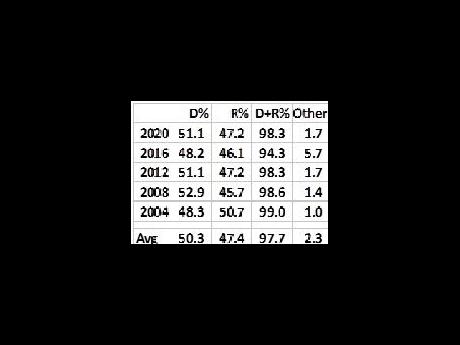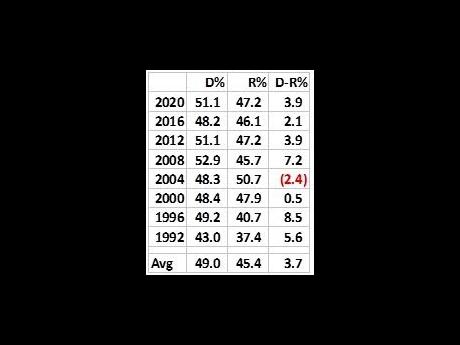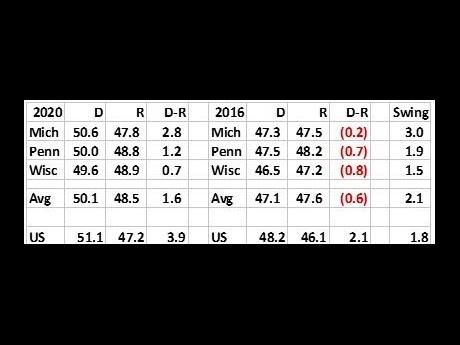Kevin O’Brien Chang | Democracy prevails in the United States
It was billed as ‘All About Trump’. But in recent historical context, the US 2020 presidential election was a pretty normal battle of Democratic and Republican voter bases. The combined vote percentage of the two main parties was about 98.3 per cent, similar to 98.3 per cent in 2012, 98.6 per cent in 2008, and 99 per cent in 2004. The outlier was 2016, when Democrats and Republicans combined for only 94.3 per cent of the total vote. (See Table 1)
While 5.7 per cent voted ‘other’ in 2016, only 1.7 per cent did so in 2020. The Democrat vote increased 2.9 per cent, from 48.2 per cent to 51.1 per cent. The Republican vote went up 1.1 per cent, from 46.1 per cent to 47.2 per cent. In short, 2012 and 2020 results were ‘normal’. However, 2016 was an aberration of party faithful rejecting unappealing candidates, with Hillary Clinton costing Democrats more votes than Donald Trump cost Republicans.
In 2020, the wandering sheep returned to the fold along 2012 lines. Though more people voted, the 2020 party percentages were almost identical to 2012, and the plus 3.9 per cent Democrat gap was close to the 3.7 per cent average of the past eight elections. It was, in essence, a reversion to the mean. (See Table 2)
Donald Trump certainly got more people shouting and louder and on to the streets. Yet for all the talk of extremism, when it came to walking the walk, voters pretty much hewed to party patterns of recent decades. Only convoluted vote counting made the election appear close for a few days.
PENNY DROPPED
On election night Biden built an early lead in Florida and Ohio, but Trump closed strongly to win both. Then Trump jumped ahead in Michigan, Wisconsin, Pennsylvania, Georgia, and it looked all over. At 10 p.m., betting markets such as Betfair gave Trump an 80 per cent chance of victory.
Then the penny dropped. The early mail-in votes were strongly Democratic, but Florida and Ohio counted these first, while Michigan, Wisconsin, Pennsylvania, Georgia counted them last. Betters recalculated, and by midnight it was 60 per cent Trump 40 per cent Biden. By 8 a.m. the next day, it was 80 per cent Biden 20 per cent Trump. By 2 p.m. it was 90 per cent Biden and 10 per cent Trump, meaning the betters had basically called it for Biden.
The mainstream media waited till Saturday to make it official, but the money men had declared ‘Old Joe’ the winner from mid Wednesday. Had all states counted in the same sequence, the real trend would have been obvious early, and Biden’s win would have been as routine as Obama’s in 2012.
We heard a lot about special ‘targeting’ of the ‘battleground’ states that gave Trump his electoral college victory in 2016, despite losing the popular vote. Yet the key states of Michigan, Pennsylvania and Wisconsin swung like the rest country, roughly two per cent Democrat. (See Table 3)
For all the overheated rhetoric and mass demonstrations and record money spent, tribal party loyalty trumped everything, including Trump. The 2020 Democrat margin of about four per cent roughly matched their average popular vote advantage over Republicans since 1988.
Many talked in the run-up of ‘shy’ Trump voters, who supported ‘The Donald’ but were reluctant to say it out loud to pollsters. When actual votes were compared to state and national polls, Biden mostly matched predictions, but Trump consistently outdid the polls by about three per cent. For instance, Realclearpolitics.com’s final national poll average was Biden 51.2 Trump 44. Add three points to Trump and you get Biden 51.2 Trump 47. Current results are Biden 51.1 Trump 47.2. It’s quite possible then that about three per cent of ‘undecideds’ were Trump supporters in hiding – not a huge amount, but enough to throw off polls.
Two intriguing demographic gaps between Democrats and the GOP are males versus females and single females versus married females. It will take serious sociological study to discern what these divides mean. But men vote more Republican than women among all races, and white men are the most Republican group. Yet ironically, every segment except white males voted more Republican in 2020 than in 2016. Among white males, Democrats gained seven per cent and Republicans lost one per cent, and it was this eight per cent net gain that gave Joe Biden victory.
REFUSAL TO CONCEDE
What was unprecedented about 2020 was Trump’s refusal to concede, and the silent consent of GOP leaders. This can be read in many ways. One is a desperate, last stand bunker mentality. Republicans have lost the popular vote in seven of the last eight presidential elections, by an almost four per cent average. Only the illogical electoral college system, which in effect gives the GOP a three per cent or so head start in presidential voting, won them the presidency in 2000 and 2016. One popular vote victory in 32 years is surely a sign of an entrenched minority party.
Demography is the most likely explanation. In a crude birth rate nutshell, the mostly conservative white Republican base has been reproducing at a lower rate than the non-white minority and liberal white Democratic base. The future always belongs to those who propagate. (Crude racial simplifications are unavoidable in word limit pieces). To become consistently competitive again in presidential elections, the GOP will have to become more inclusive.
In The Light That Failed: A Reckoning, Ivan Krastev and Stephen Holmes argue that Trump’s racially charged ‘Make America Great Again’ and ‘Build the Wall’ campaigns are rooted in whites diminishing as a proportion of the US populace. They liken his rhetoric and actions to the xenophobic reactions of Eastern European leaders to their changing demographics and shrinking populations. In an alarming perversion, Trump elevated anti-democracies such as Putin’s Russia and Orbán’s Hungary into models for the United States.
In such a context, those who see the US as an example to the world must be glad that Biden’s decisive popular vote win was not warped into defeat by the archaic electoral college system. The system worked, if only just. Unlike 2016, America now has a president voted for by a majority of the people. True democracy has prevailed.
- Kevin O’Brien Chang is director of Fontana Limited. Send feedback to kob.chang@fontanapharmacy.com.





